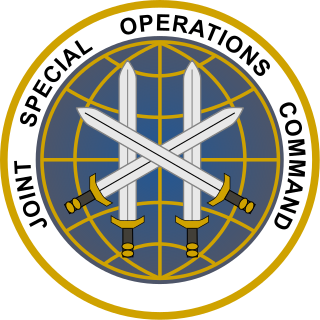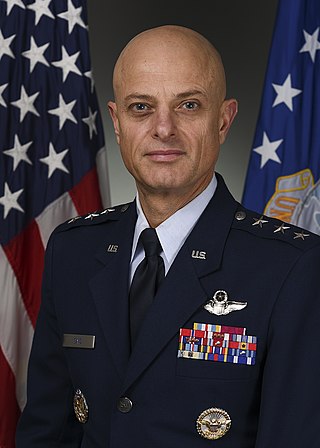
The Joint Special Operations Command (JSOC) is a joint component command of the United States Special Operations Command (USSOCOM) and is charged with studying special operations requirements and techniques to ensure interoperability and equipment standardization, to plan and conduct special operations exercises and training, to develop joint special operations tactics, and to execute special operations missions worldwide. It was established in 1980 on recommendation of Colonel Charlie Beckwith, in the aftermath of the failure of Operation Eagle Claw. It is headquartered at Pope Field.
The Raid onKhataba, also referred to as the raid onGardez, was an incident in the War in Afghanistan in which five civilians, including two pregnant women and a teenage girl, were killed by U.S. forces on February 12, 2010. All were shot when U.S. Army Rangers raided a house in Khataba village, outside the city of Gardez, where dozens of people had gathered earlier at the home to celebrate the naming of a newborn baby. Initially, U.S. Military officials implied the three women were killed before the raid by family members, reporting that the women had been found "tied up, gagged and killed." But investigators sent by the Afghan government reported, based on interviews and pictures of the scene, that the special operation forces removed bullets from the victims' bodies and cleaned their wounds as part of an attempted coverup. NATO denied this allegation, and Afghan investigator Merza Mohammed Yarmand stated, "We can not confirm it as we had not been able to autopsy the bodies." The US military later admitted that the special operations unit killed the three women during the raid.

The Embassy of the United States of America in Kabul was the official diplomatic mission of the United States of America to the Islamic Republic of Afghanistan. The embassy was housed in a chancery located on Great Massoud Road in the Wazir Akbar Khan neighborhood of the Afghan capital, Kabul, and was built at a cost of nearly $800 million. On August 15, 2021, in the face of a Taliban advance on Kabul, embassy staff relocated to makeshift but secure facilities at Hamid Karzai International Airport. Kabul fell and the chancery building officially closed late August 15th.

Many states began to intervene against the Islamic State, in both the Syrian Civil War and the War in Iraq (2013–2017), in response to its rapid territorial gains from its 2014 Northern Iraq offensives, universally condemned executions, human rights abuses and the fear of further spillovers of the Syrian Civil War. These efforts are called the war against the Islamic State, or the war against ISIS. In later years, there were also minor interventions by some states against IS-affiliated groups in Nigeria and Libya. All these efforts significantly degraded the Islamic State's capabilities by around 2019–2020. While moderate fighting continues in Syria, as of 2024, ISIS has been contained to a manageably small area and force capability.

Operation Inherent Resolve (OIR) is the United States military's operational name for the international war against the Islamic State (IS), including both a campaign in Iraq and a campaign in Syria, with a closely related campaign in Libya. Through 18 September 2018, the U.S. Army's III Armored Corps was responsible for Combined Joint Task Force – Operation Inherent Resolve (CJTF—OIR) and were replaced by the XVIII Airborne Corps. The campaign is primarily waged by American and British forces in support of local allies, most prominently the Iraqi security forces and Syrian Democratic Forces (SDF). Combat ground troops, mostly special forces, infantry, and artillery have also been deployed, especially in Iraq. Of the airstrikes, 70% have been conducted by the military of the United States, 20% by the United Kingdom and the remaining 10% being carried out by France, Turkey, Canada, the Netherlands, Denmark, Belgium, Saudi Arabia, the United Arab Emirates, Australia and Jordan.
The following lists events that happened during 2015 in Afghanistan.

Since the September 11 attacks, the United States has carried out drone strikes in Pakistan, Yemen, Somalia, Afghanistan, Iraq and Libya.

The Islamic State – Khorasan Province is a regional branch of the Salafi jihadist group Islamic State (IS) active in South-Central Asia, primarily Afghanistan and Pakistan. ISIS–K seeks to destabilize and replace current governments within historic Khorasan region with the goal of establishing a caliphate across South and Central Asia, governed under a strict interpretation of Islamic sharia law, which they plan to expand beyond the region.
The following lists events that happened during 2016 in Afghanistan.
Events in the year 2017 in Afghanistan.

Kenneth Franklin McKenzie Jr. is a retired United States Marine Corps general who served as the 14th commander of the United States Central Command from March 28, 2019 to April 1, 2022. He served as Director of the Joint Staff from July 5, 2017 after having previously served for two years as Director of Strategic Plans and Policy (J-5) on the Joint Staff.
Events in the year 2018 in Afghanistan.

The Islamic State–Taliban conflict is an ongoing armed conflict between the Islamic State and the Taliban in Afghanistan. The conflict escalated when militants who were affiliated with Islamic State – Khorasan Province killed Abdul Ghani, a senior Taliban commander in Logar province on 2 February 2015. Since then, the Taliban and IS-KP have engaged in clashes over the control of territory, mostly in eastern Afghanistan, but clashes have also occurred between the Taliban and IS-KP cells which are located in the north-west and south-west.

The US intervention in the Syrian civil war is the United States-led support of Syrian opposition and the Federation of Northern Syria during the course of the Syrian Civil War and active military involvement led by the United States and its allies — the militaries of the United Kingdom, France, Jordan, Turkey, Canada, Australia and more — against the Islamic State of Iraq and the Levant (ISIL) and al-Nusra Front since 2014. Since early 2017, the U.S. and other Coalition partners have also targeted the Syrian government and its allies via airstrikes and aircraft shoot-downs.

Sami Dia Said is a retired lieutenant general in the United States Air Force, who last served as the Inspector General of the Air Force. In this capacity, he reports to the Secretary of the Air Force, Chief of Staff of the Air Force, and Chief of Space Operations on matters concerning Department of the Air Force readiness, efficiency and the military discipline of active duty, Air Force Reserve and Air National Guard forces. He also provides inspection policy and oversees the inspection and evaluation system for all Department of the Air Force nuclear and conventional forces; oversees Department of the Air Force counterintelligence operations; investigates fraud, waste and abuse; oversees criminal investigations; and provides oversight of complaints resolution programs. Said is responsible for three field operating agencies: the Air Force Inspection Agency, the Office of Special Investigations, and the Department of Defense Cyber Crime Center.

Operation Allies Refuge was an evacuation effort carried out by the United States during the 2021 Taliban offensive. It took place in the final weeks of the War in Afghanistan and saw the airlifting of certain at-risk Afghan civilians, employees of the American embassy in Kabul, and other prospective applicants for the U.S. Special Immigrant Visa (SIV). American personnel also helped NATO and other regional allies in their respective evacuation efforts from Hamid Karzai International Airport in the capital city of Kabul. The operation was concurrent with the broader American military withdrawal from Afghanistan and the multinational evacuation of eligible foreigners and vulnerable Afghans.

Large-scale evacuations of foreign citizens and some vulnerable Afghan citizens took place amid the withdrawal of US and NATO forces at the end of the 2001–2021 war in Afghanistan. The Taliban took control of Kabul and declared victory on 15 August 2021, and the NATO-backed Islamic Republic of Afghanistan collapsed. With the Taliban controlling the whole city except Hamid Karzai International Airport, hostilities ceased and the Taliban assisted in the evacuation effort by providing security and screening evacuees.
A suicide bombing took place at Hamid Karzai International Airport in Kabul, Afghanistan, on 26 August 2021, at 17:50 local time, during the evacuation from Afghanistan. At least 183 people were killed, including 170 Afghan civilians and 13 members of the United States military, the first American military casualties in the War in Afghanistan since February 2020. The Islamic State – Khorasan Province (ISIS–K) claimed responsibility for the attack.
On 18 March 2019, during the Battle of Baghuz Fawqani, the Talon Anvil special operations group, a Delta Force unit within the larger Task Force 9 of the United States Armed Forces, carried out an airstrike using an F-15E fighter-attack aircraft in Al-Baghuz Fawqani, Syria. The incident was concealed by the U.S. military, and was first reported on 14 November 2021 by The New York Times, who reported that the incident led to the deaths of 80 people, 64 of whom were civilians, which would make it one of the largest civilian casualty incidents of the war against the Islamic State. A US military investigation in May 2022 concluded that the airstrike killed 52 ISIL fighters and 4 civilians and did not violate the laws of war.











